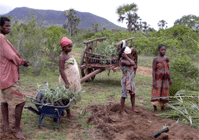In view of the predominance of exploitative forms of
forest use in the world's most sensitive forest ecosystems,
and the high relevance of the very same forests for the most
vulnerable parts of the populations, introducing sustainable
methods of forest management is of key importance. While the
development of forestry and forest industries which allow
a permanent supply of raw material is a serious challenge,
valuating forests also in terms of their social and environmental
functions will stay top of the agenda in the coming decades.
Ensuring forest multi-functionality means that
in trying to enhance economic revenues from forestry the social
aspect is taken into account: e.g. economic development of
the local community, community-based forest tenure systems,
social and cultural integrity, community health, workers'
rights. In environmental terms, issues such as soil and water
conservation need to be respected, the condition of the vegetation
(logging without causing drastic changes to the original stand
structure and composition) and condition of wildlife (efforts
to protect the wildlife and their habitats from disturbances
caused by timber harvesting or other activities).
OECD has analysed annual forest sector ODA between
1973 and 1998 (2000) to be about 500 million US $ annually,
which is about 1% of total ODA. Although the decline of total
ODA has been stopped in recent years, ODA to the forest sector
continues to decrease. While illegal logging causes estimated
losses of 10 to 15 billion US $, ODA as yet represents only
about one tenth of these financial losses due to illegal activities.
As much as illegal logging, the mobilisation of financial
resources for forest sector development, participation of
the civil society in decision making and mainstreaming forestry
are all strongly influenced by the quality of the partner
country’s governance system.
Profitting from a broad range of professions
that are represented in our team, ECO starts from a holistic
perspective, putting sustainable forest management into an
interdisciplinary, inter-sectoral and regional development
context.
Consulting services are offered in the
following fields:
• Forest policy and framework conditions
• Formulation of national forest policies
• Development of legislation and regulations
• Sustainable management of forest resources
•Inventory and forest management planning
• Rehabilitation, silvicultural management and protection
• Harvesting
• Certification of forest management and products
• Forestry research
• Social Forestry
• Joint implementation projects – CO2-sequestration
• Agroforestry
• Rangeland management
• Processing and marketing of timber and non-timber
forest products
• Wood processing
|
 |
| Long-term
management plans must reckon with demands of a variety
of forest products, and with a rapid change of these demands. |
 |
| Afforestation in Madagascar.
Residents should be the major force behind sustainable
forest management. |
Your contact:
Dr. Steve
Sepp:
|







